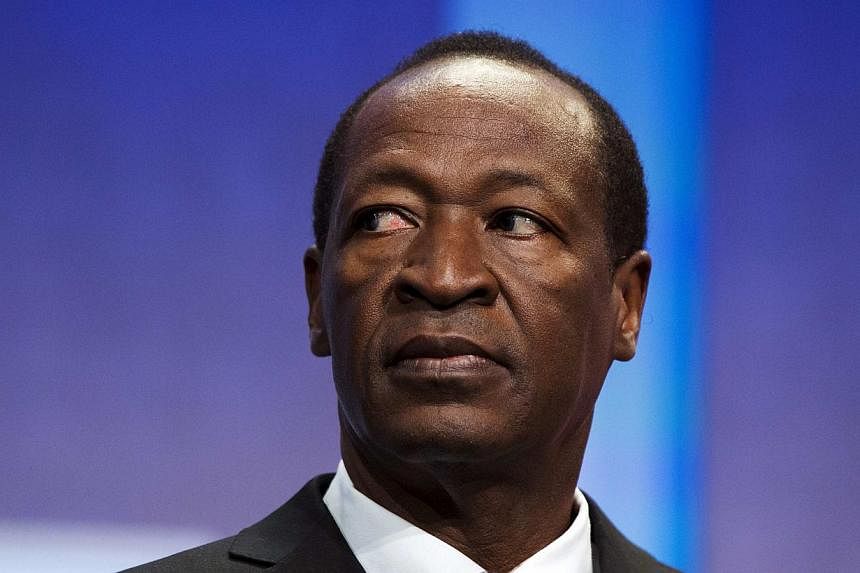OUAGADOUGOU (REUTERS) - Burkina Faso's President Blaise Compaore said on Thursday that he would stay in power at the head of a transitional government until after elections, rejecting opposition calls for him to step down immediately following a day of violent protests.
The head of the armed forces, General Honore Traore, had earlier dissolved parliament and announced talks with all political parties to create an interim government to take the West African country to democratic elections within a year.
The move came after at least three protesters were shot dead and scores wounded in clashes with security forces as demonstrators attacked the homes of senior members of the ruling party and symbols of Compaore's long rule.
Hundreds of people had earlier stormed parliament, looting the building and setting it on fire, while others ransacked state television, forcing it off the air.
Protests also gripped Bobo Dioulasso, Burkina's second-largest city, and other towns across the gold and cotton-producing country.
"I have heard the message, understood it and taken note of strong desire for change," Compaore said in a statement broadcast on BF1 TV. "I am available to open talks on a transitional period at the end of which I will hand over power to the democratically elected president."
Compaore, who seized power in a military coup in 1987, said he had dissolved his government and was lifting martial law that was announced earlier in the day. He also scrapped plans for an unpopular constitutional amendment that would have allowed him to seek reelection next year, a prospect that had sparked Thursday's protests.
Regional West African bloc ECOWAS had said earlier on Thursday that it would not accept any party seizing power through non-constitutional means - suggesting diplomatic pressure to leave Compaore in place. A delegation from the African Union, the United Nations and ECOWAS was due in Burkina Faso on Friday to hold talks with all parties involved.
- "Blaise Leave" -
Protesters had faced off with security forces for several hours outside the presidential palace as opposition leaders held talks with senior military officials in an attempt to ease Compaore from power. Both opposition politicians and ordinary demonstrators made it plain they did not want any role for Compaore in a transition.
"We want Blaise Compaore to leave. We want change," said George Sawadogo, a 23-year-old student.
The fate of Compaore, a close military ally of the United States and former colonial power France, will be closely watched by other governments across West and Central Africa, where a number of long-serving leaders are reaching the end of their constitutional terms.
Burkina Faso is one of the world's poorest nations but has positioned itself as a mediator in regional crises. It is also a key ally in Western operations against al Qaeda-linked groups in West Africa.
White House spokesman Bernadette Meehan had earlier said in a statement that the United States was deeply concerned by the deteriorating situation in Burkina Faso and called on all parties to end the violence and respect democratic norms.
France, which has a special forces base there that conducts operations across the Sahel, also appealed for restraint by all sides. Its ambassador had held talks with opposition leaders on Thursday.
- Concern about prosecution -
Compaore has ruled the nation with a firm grip but has faced increasing criticism in recent years, including defections by members of his party. He weathered a military and popular uprising in 2011, thanks to the support of his elite presidential guard.
Diplomatic pressure had mounted over the past year for Compaore to step down in 2015, amid calls from his own entourage for him to seek re-election, diplomats said.
A letter from French President Francois Hollande to Compaore earlier this month, seen by Reuters, offered France's support in finding him a job with an international organisation.
Diplomats, however, say Compaore has been concerned about the possibility of losing his immunity from prosecution, particularly in the wake of the trial of former Liberian leader Charles Taylor in the Hague. Burkina Faso's former president Thomas Sankara, a leftist leader dubbed Africa's Che Guevara, was killed in the coup that swept Compaore to power.
Protesters in the streets of Ouagadougou waved photographs of Sankara and signs reading "Sankara look at your sons. We are fighting your fight."
At the headquarters of state television, which was forced off the air after the building was taken, jubilant protesters posed on the set of the evening news programme.
Burkina Faso, the fourth-largest gold producer in Africa, is home to several international mining firms including TrueGold , IamGold and Randgold Resources.
"There's been no impact on our operations whatsoever," said Doug Reddy, senior vice president for business development at Endeavour Mining, which has a mine near the southern border with Ghana. "Obviously, we're monitoring the situation and we're keeping in touch with our people in the mine."

